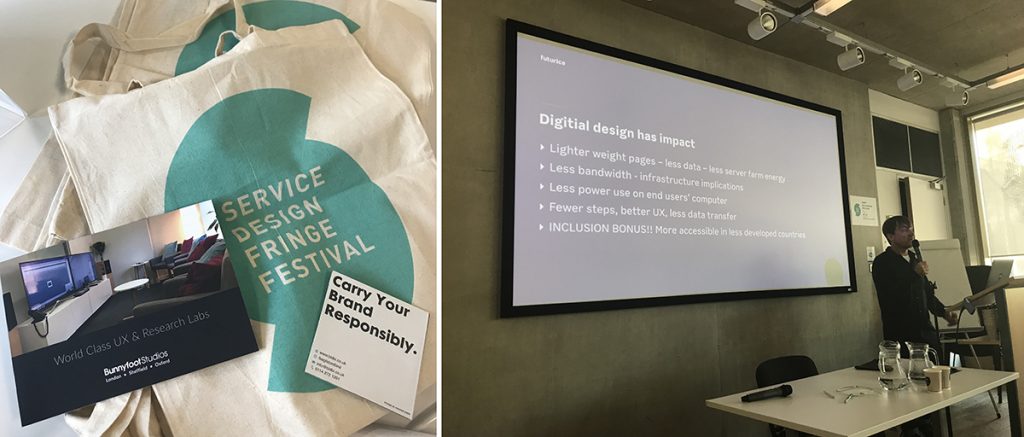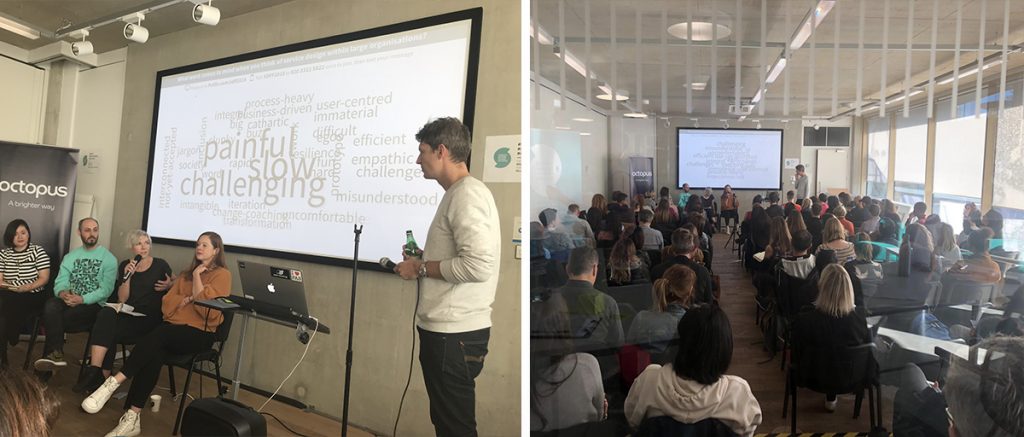Giving myself enough time to reflect on the Service Design Fringe Festival as one of the 2018 organisers I can firmly say that the Festival was a success and worth of my time and energy investment putting aside/greying out countless meetings and myriads of emails, hungry late night catch-ups and playing “hardcore Tetris” with the agenda!
How we measured success
That was the fifth year of the festival and we had our success measurements:
- This year festival consisted of 3 full days with over 60 events ran on 3 stages (including the Design Museum, for the 1st time)
- We broke our attendance record – more than 2000 inspired people
- 1st time we dared to set up a theme of the year to raise a critical discussion of inclusion in the service design focusing on the future of the industry, how we make change happen and how we service design with people on the fringes
- We experimented with several festival events formats: service design recruitment speed dating, panel debates and rising stars’ lightning talks
- We live-streamed many of our events through twitter
New inclusive formats
As the Festival is a safe place for everyone to question, share and experiment, we encouraged our hosts to try out new inclusive events formats that they, otherwise, won’t dare at other industry conferences. Below are some festival events that went beyond my expectations as the organiser and service design practitioner.

In his fascinating talk, Alex Crowfoot, the former Head of Discovery at ustwo and current Design Director at Futurice, questioned how planet-inclusive we are as service designers who bring new products and services to life, devise different ways to interact and create new habits. Digital means these can scale at an unprecedented rate. Yet many of us don’t include the potential environmental impact at the design stage. Alex not only unveiled why we need to include planet into our design processes but also how we can do it by sharing his planet-centred service design tools and giving concrete digital project examples.
While Alex provoked a critical discussion around our responsibility to save the planet by leading (non)-digital projects with a sustainability perspective in mind, Vanessa Faloye from Fearless Futures questioned our deep understanding of human-centred design and the notion of privilege by leading a touching unconventional workshop. In a ‘closed eye’ circle we went back to their childhood and revised it through the prism of privileges afforded to us and always taken for granted. This activity went beyond a traditional workshop format by crossing emotional boundaries and making invisible ‘others’ visible. Vanessa provided a necessary reality check on what it means to design *with* others and whom we might still miss in our human-centred design process.
Other service design talks that went beyond presenting success stories, impressive stats and boastful case studies were two panels addressing very different industry challenges.

‘Pathways into service design & ways to showcase our work in museums’ panel was initiated by the Design Museum eager learn who become service designers and what are the best ways of smartly praising service design work and its impact in public spaces, like contemporary museums. Moderated by Benjamin Lyons-Grose, the Head of Service Design & UX at Methods, service design experts from Octopus Labs, LCC, University of the Arts, Design Thinkers Academy and the Design Museum itself vigorously debated about the unsteady future of the industry with its certification, new education opportunities and necessary skills of upcoming service designers cohorts.
‘Love spread or blood spilt: what does it really take to make change happen with service design?’ panel was facilitated by Ross Breadmore, currently challenging 200-year-old Lloyds bank, who masterfully invited four leaders from public (Health England) and private (BBC, Idean UK and Furthermore) sectors to share their uncensored stories of failures and hard-earned achievements of introducing service design to organisations and getting buy-in from C-level.
Find out more





